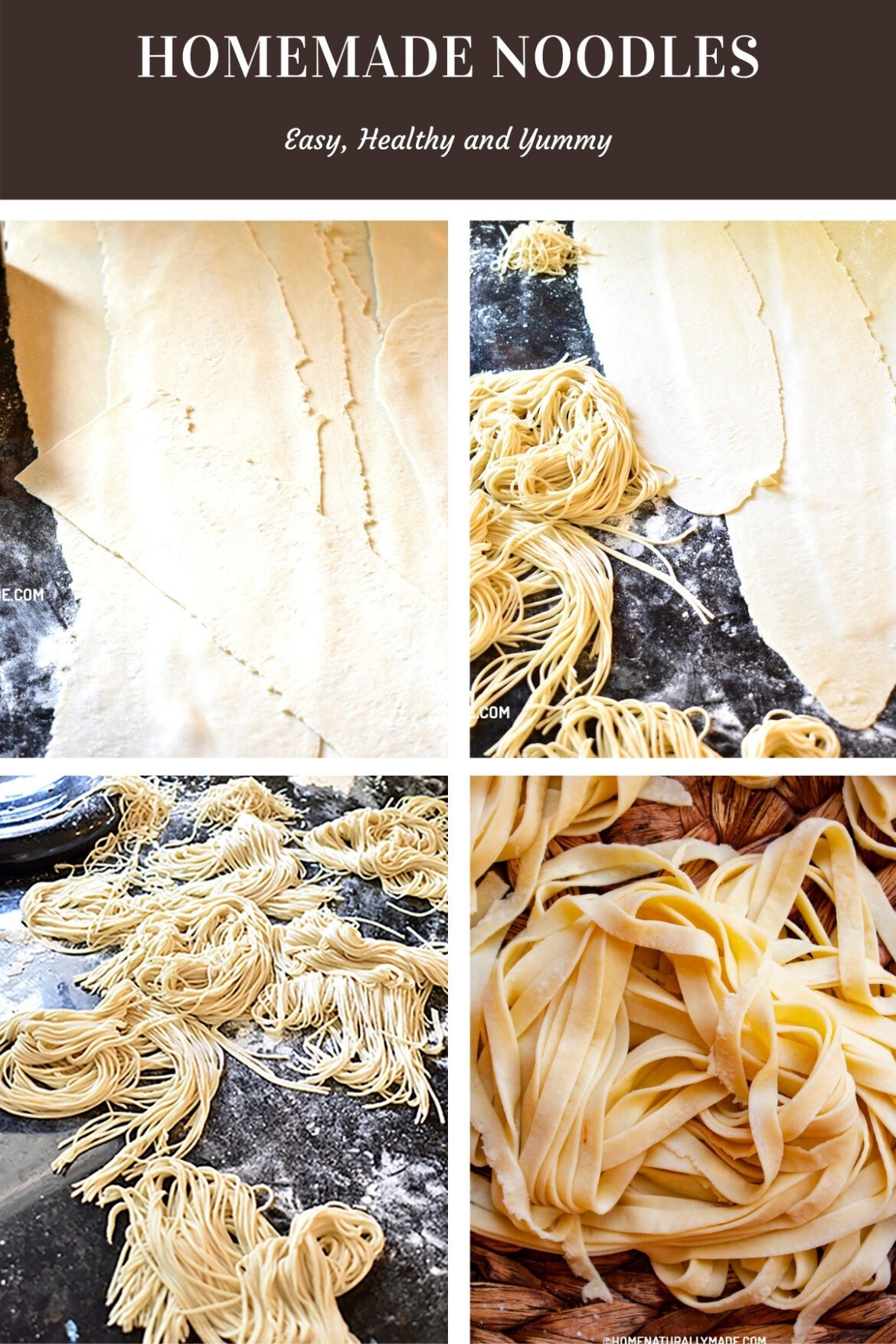Table of Contents
Homemade Noodles from Scratch using three {3} simple ingredients is easy, healthy, and naturally yummy. Perfect for any noodle soup, especially Yang Chun Noodle, as well as Chinese Stir Fry Noodles and Chow Mein. Homemade Noodles are deliciously healthy. All you need is 3 simple ingredients – organic all-purpose flour, avocado oil, Himalayan Pink Salt or sea salt, and water. Keep reading to learn all the tips and tricks to make this perfectly with ease every time!
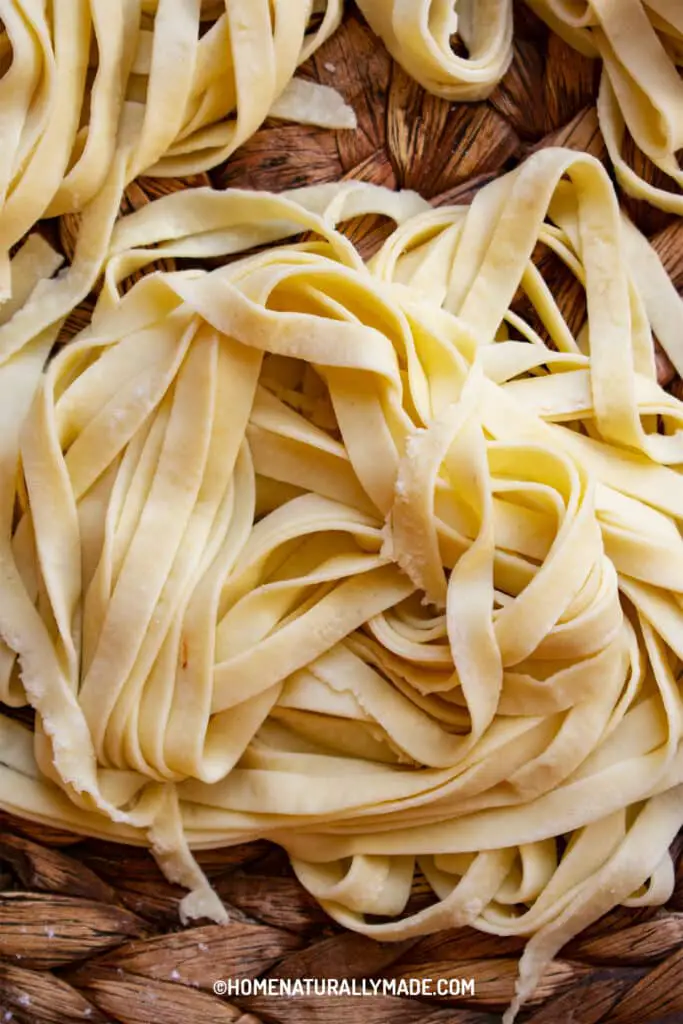
If you have a KitchenAid Stand Mixer with a noodle-maker attachment like I do or a standalone manual noodle maker, it is easy to make fresh noodles from scratch at home.
Depending on whether you add eggs into the dough, you can make two types of noodles from scratch at home: Egg Noodles or just Noodles.
This recipe is for noodles without adding eggs into the dough. If you like egg noodles, make sure you check out my Homemade Egg Noodle From Scratch recipe.
How do you make noodles from scratch?
Homemade Noodles Step 1 – Make the Dough
For easier and accurate measurement, I use Gram as a measuring unit here, which you can manage with ease using a kitchen scale.
Add 660 grams of flour (about 4 cups), 25 grams of avocado oil, and half a teaspoon of Himalayan salt into a mixing bowl
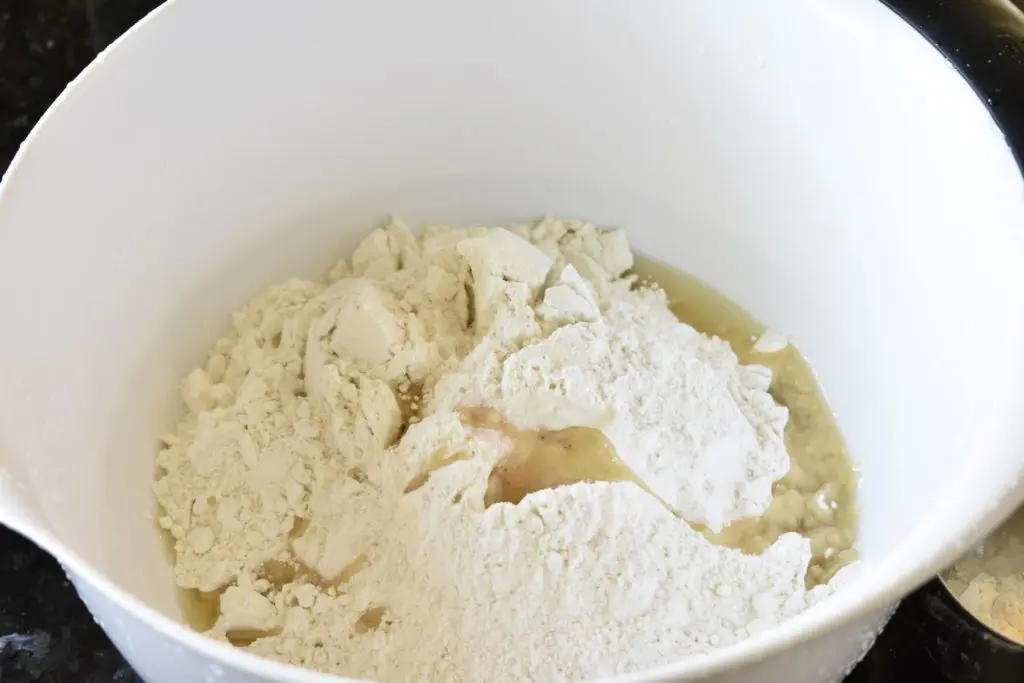
Add 225 grams of water (about 1 cup) into a glass measuring cup first, gradually & slowly while mixing and pressing using two hands until it forms a stiff dough. The dough needs to be very stiff to make the noodle tasty without too much doughy flavor.
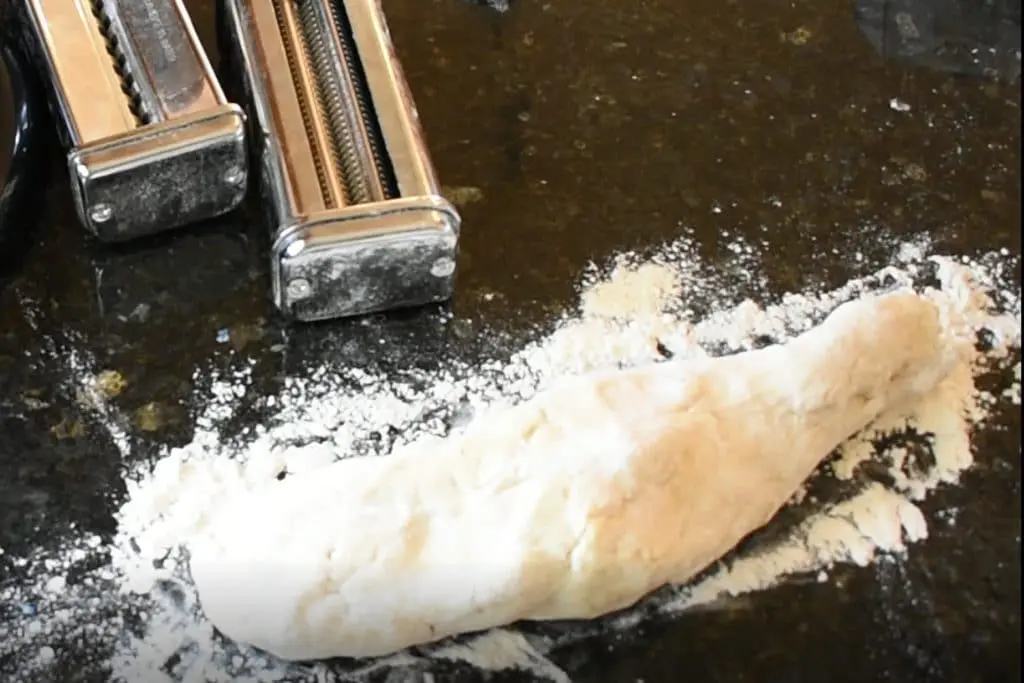
If the dough is still too dry to form a dough even after you try to use two hands to force the band, then slowly add drops of the water at a time from the additional 1 tbsp water until you can do so.
Cover the mixing bowl with a damp clean kitchen towel and let it rest at room temperature for about 10 minutes. It is important not to let the dough rest for too long, as we don’t want to activate the gluten inside the flour. Noodles have a refreshing taste and firm bite texture if we manage not to activate the gluten too much.
While waiting, fill a stockpot with 80% full of water, bring it to boil, and then turn off the heat.
Step 2 – Form Noodle Sheets
Take the dough out, cut into 7 or 8 portions, sprinkle the countertop with a thin layer of flour
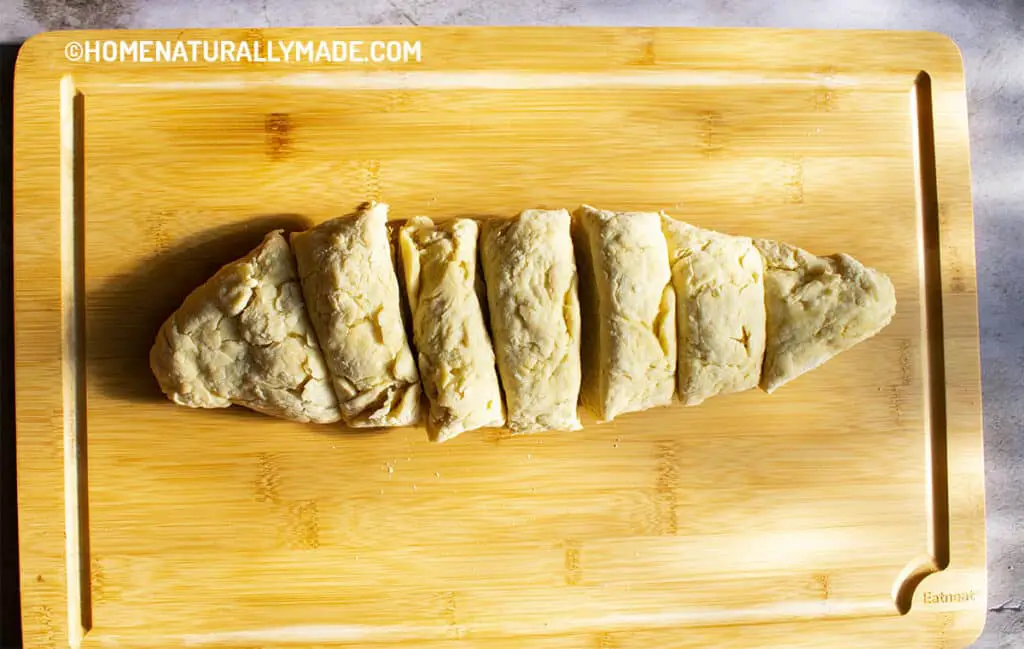
For each portion, generously coat the dough with flour and knead slightly. Don’t over-work on the dough, though. For the same reason, we don’t want to activate the gluten.
Take one portion at a time, shape it into a narrow thick dough sheet, about 4 inches wide. Repeat this for all remaining portions of dough.

Attach Kitchen Aid roller, take one piece of the flat dough sheet at a time, roll it through the roller starting from setting 1 and then move on to 2 and 3.
If you prefer thinner noodles, then go all the way to setting 4. The higher the setting, the thinner the dough sheet gets, thus the thinner the noodles become.
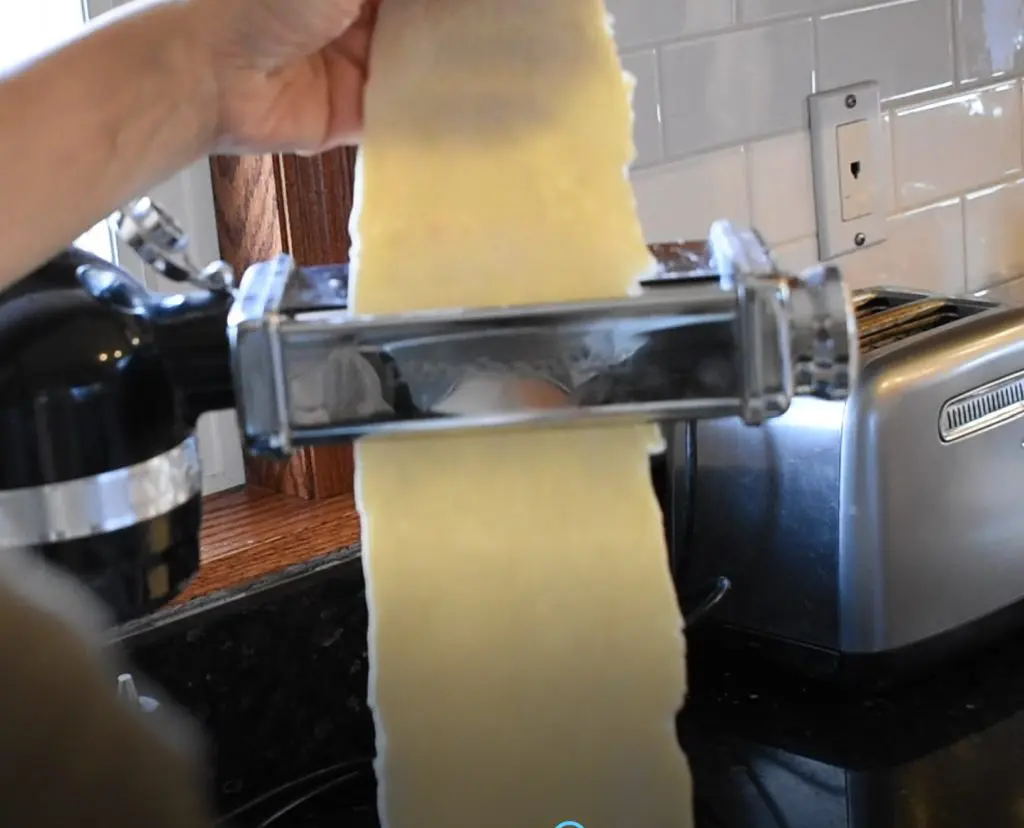
Dust the dough sheet with flour, and repeat for the remaining 7 pieces.
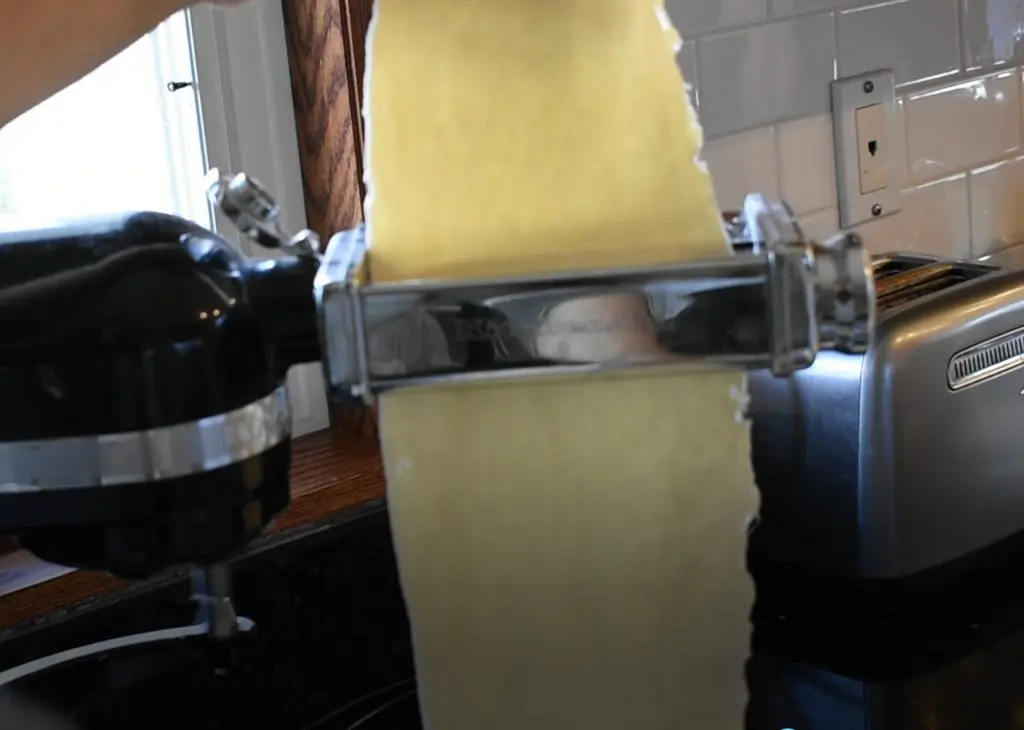
Homemade Noodles Step 3: Cut Noodle Sheets into Noddles
Attach Kitchen Aid noodle cutter, pick up 1 noodle sheet at a time, turn on the machine to medium-high, cut the noodle to the desired shape.
I typically either cut into a Spaghetti shape or Fettuccini shape.
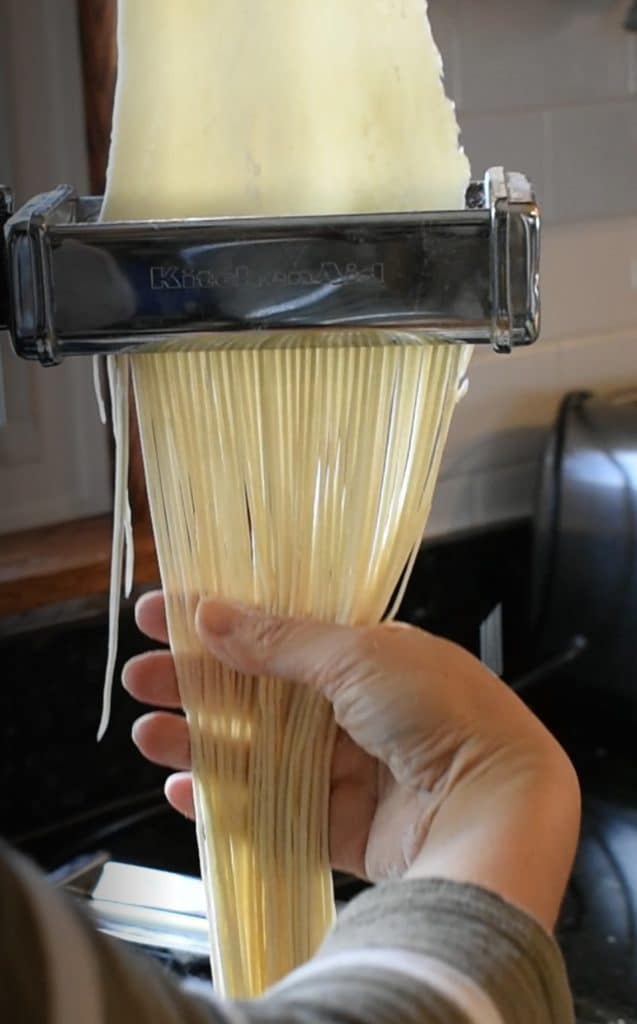
Gently twirl the noodles and loosely place them into piles, each with a handful of noodles.
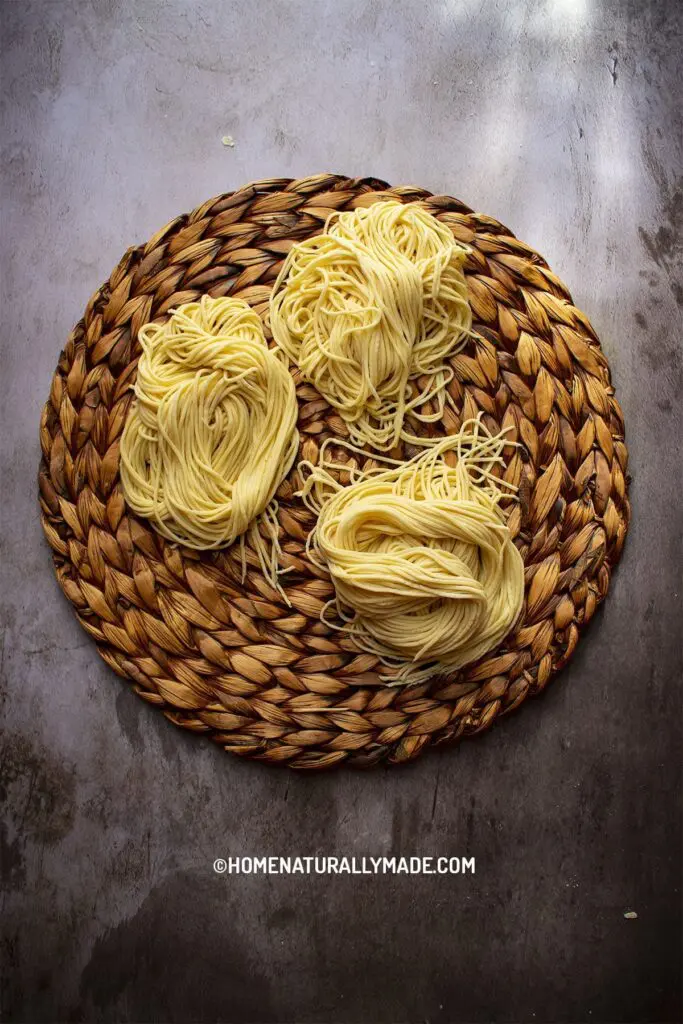
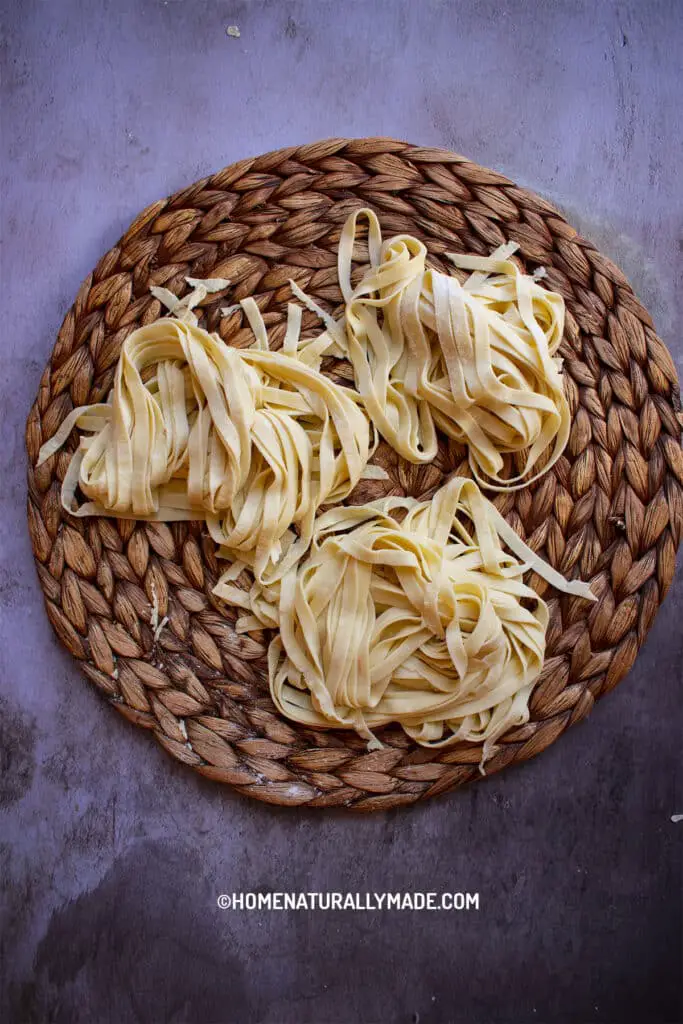
How do you cook home freshly made noodles?
Bring the stockpot water back to a boil, add only a handful of noodles at a time, immediately stir to separate them using a pair of kitchen tongs or a pair of long cooking chopsticks, and with the help of a spider skimmer.
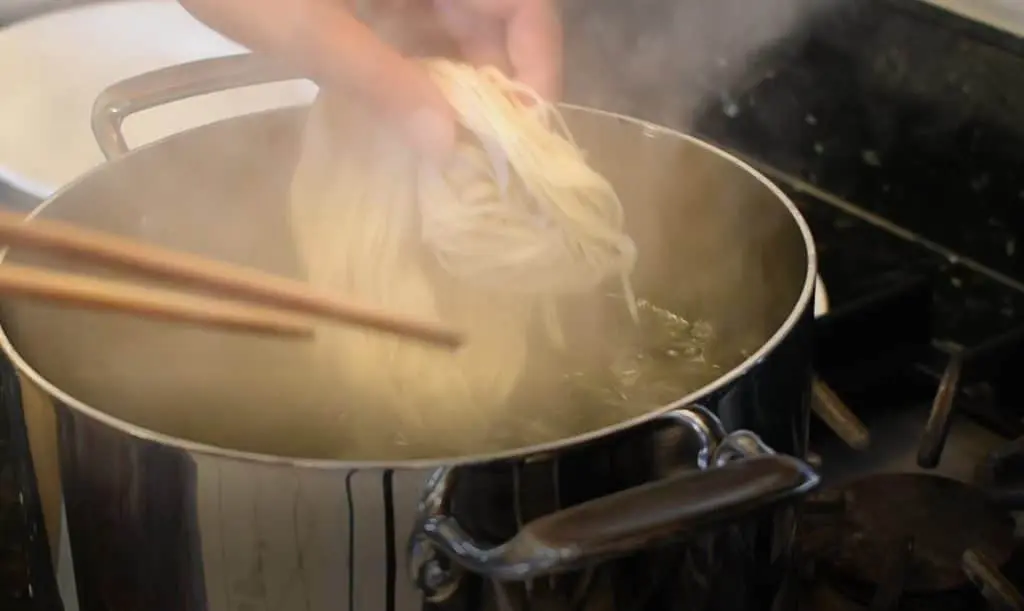
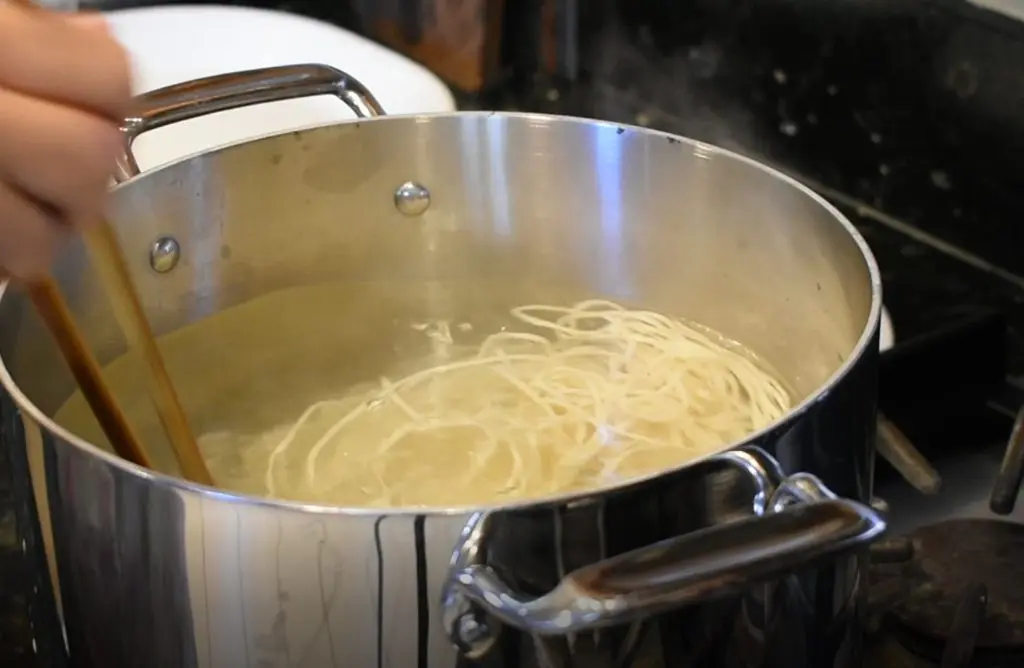
Cook for about 1 minute or till the noodles float at the top of the water, and then take the noodle out using a spider skimmer and chopsticks, or your favorite utensils, and place onto a big plate.
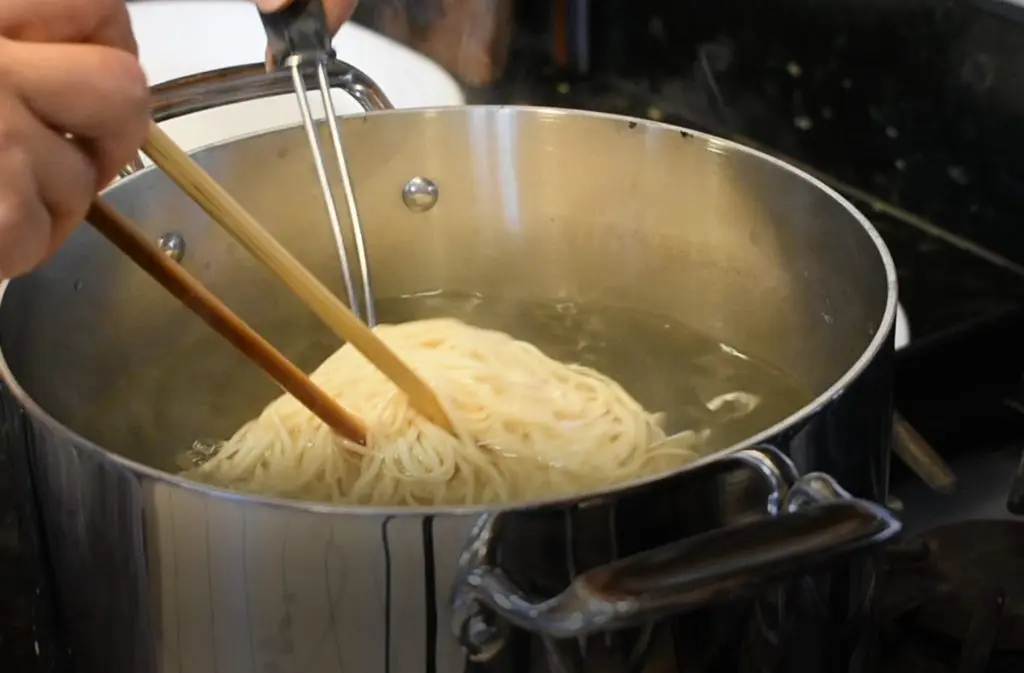
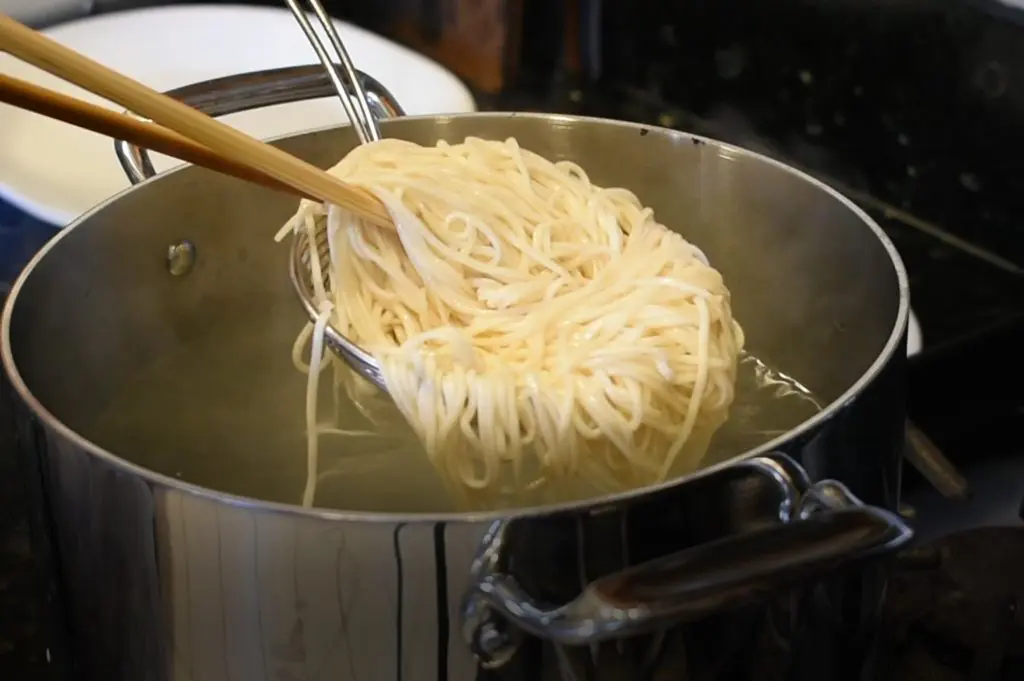
Repeat for the remaining noodles. While placing the noodles onto a plate, immediately stir gently to let out the steam and avoid noodles stick together.
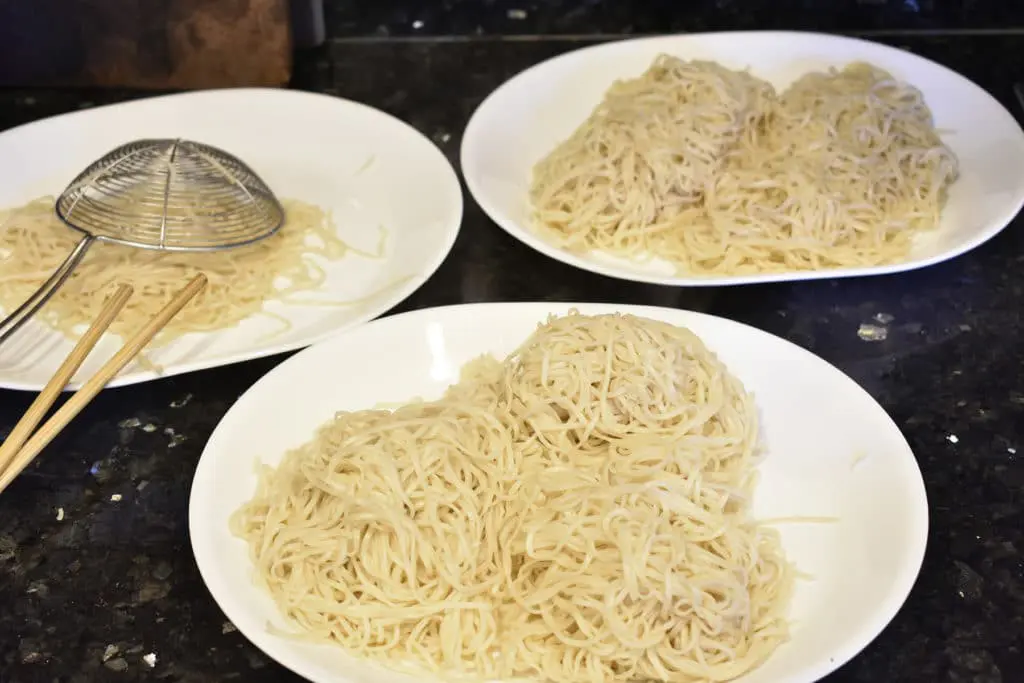
Homemade Noodles Frequently Asked Questions:
How to make my homemade noodles taste better?
From the noodles perspective – Try not to activate the gluten inside the flour. This means you only add barely enough amount of water to form a stiff dough and do not let the dough rest too long (only 10 minutes) and do not over-work the dough.
From a cooking noodles perspective – Use a big pot of boiling water to cook a handful of noodles at a time. The point is to cook the noodles as quickly as possible and try not to let noodles soak in the water for too long so that noodles maintain their texture and taste.
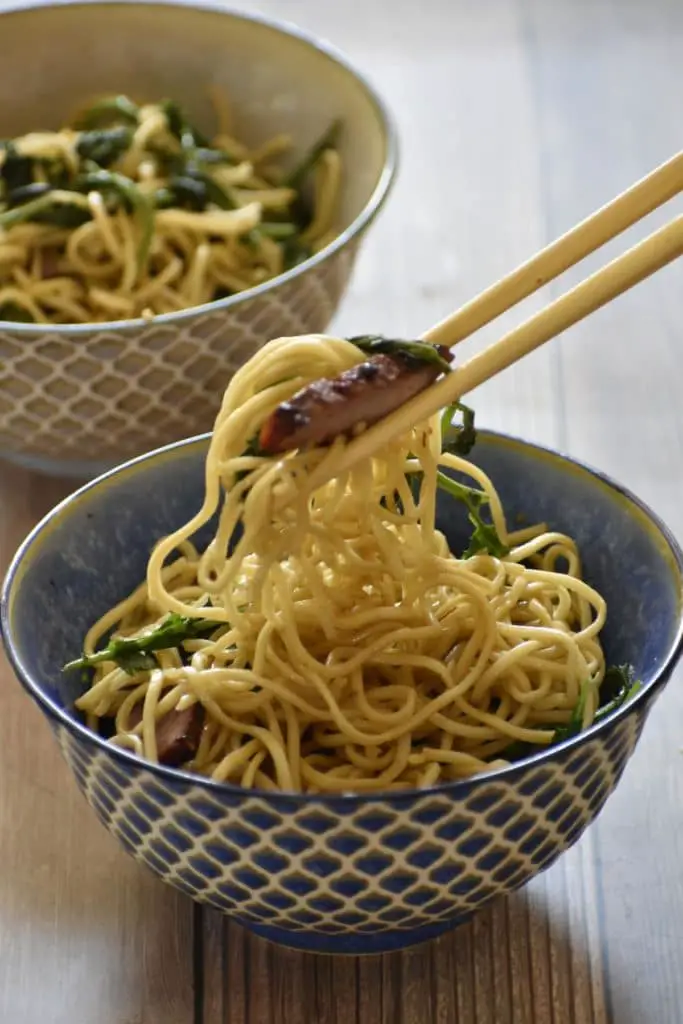
Do homemade noodles have to dry before cooking?
Absolutely not. Home freshly made noodles taste wonderful, a luxury to enjoy.
What are Hand-Pulled Noodles about?
Hand-pulled noodles use dough whose gluten has been activated. Therefore, you can stretch or pull the dough without breaking it. Because of this, the hand-pulled noodles taste very different from the noodles we are making here.
This recipe aims to make noodles without activating the gluten inside the flour to create a refreshing, firm bite noodle.
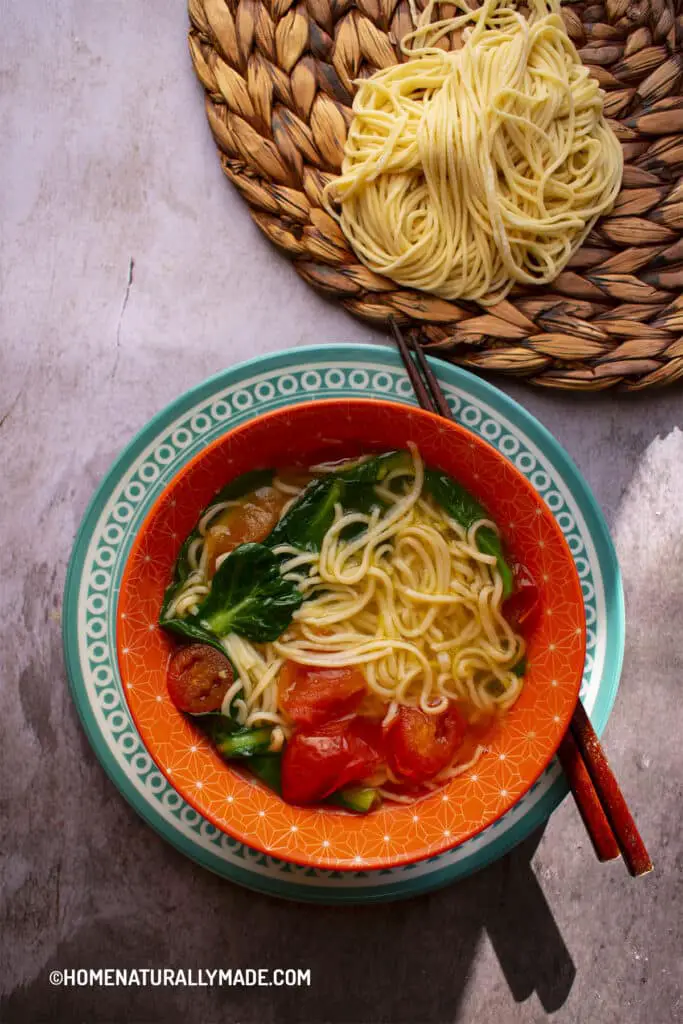
How do you store homemade noodles?
I typically store the cooked noodles, which is easier compared to drying the noodles.
These cooked noodles are good for one week in the refrigerator. We can store the rest in the freezer for up to 6 months.
Whenever you are ready to use the frozen cooked noodles, place the frozen noodles in a big pot of boiling water directly, quickly separate, and take them out. They will look and taste just like freshly cooked noodles.
What are the best ways of enjoying homemade noodles?
With homemade noodles on hand, you can whip out a tasty & healthy noodle meal in no time, Chinese Style Stir Fry Noodles, Noodle Soup, or Chow Mein.
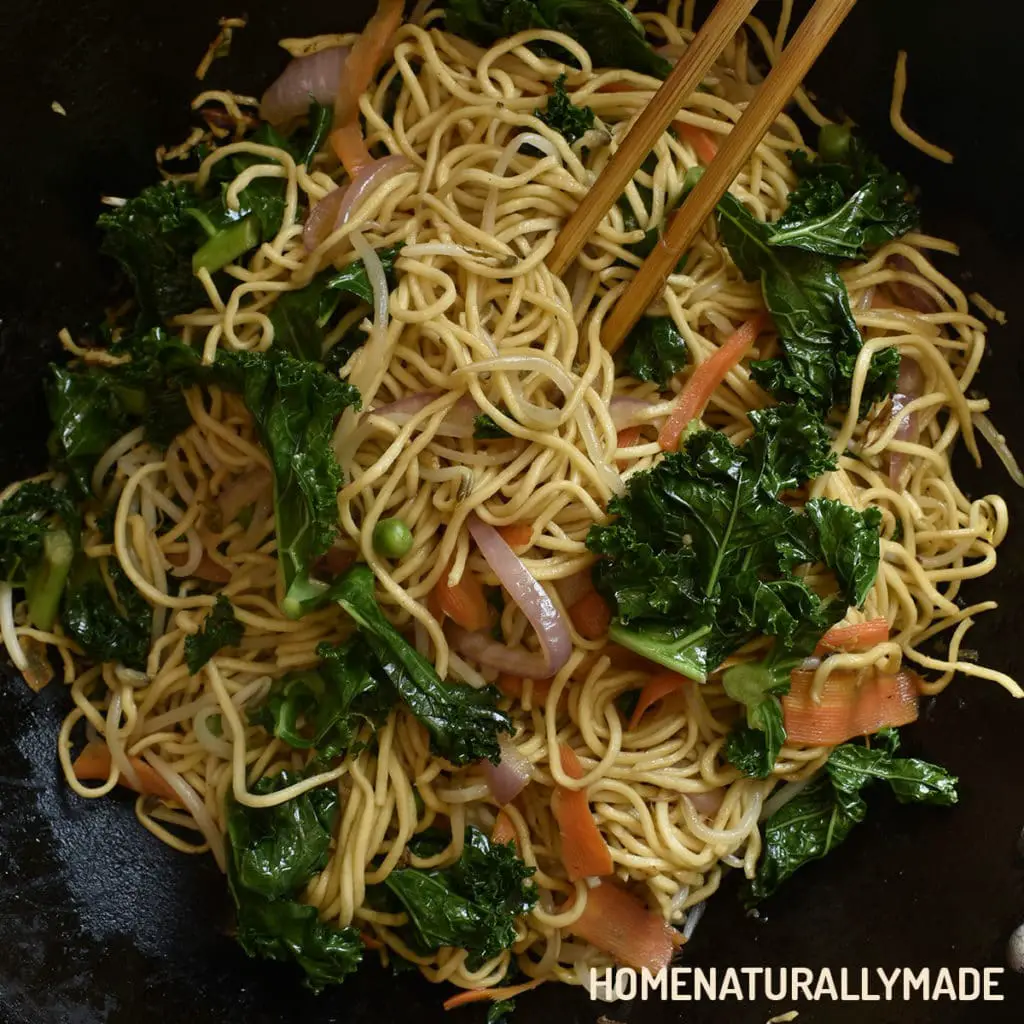
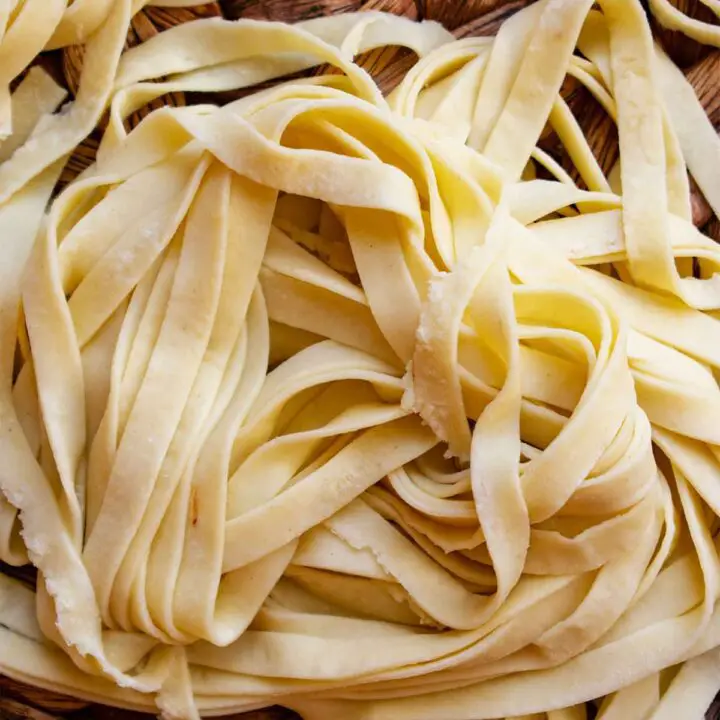
Homemade Noodles {From Scratch Easy Way} Recipe
Homemade noodles from scratch are deliciously healthy. You can make these healthy tasty noodles out of three simple ingredients: organic all-purpose flour, avocado oil, and Himalayan pink salt. With this at hand, you can whip out a delicious and healthy noodle meal such as Stir Fry Noodle, Noodle Soup, or Chow Mein in no time.
Ingredients
- 660 grams all-purpose flour, organic, about 4 cups, see notes
- 225 grams water, about 1 cup
- 25 grams avocado oil
- 1/2 tsp Himalayan salt
- 1/4 cup of organic all-purpose flour, for dusting & coating the dough later
Instructions
Step 1: Make the Dough
- Add 660 grams of flour, 25 grams of avocado oil, 1/2 tsp Himalayan salt into a mixing bowl
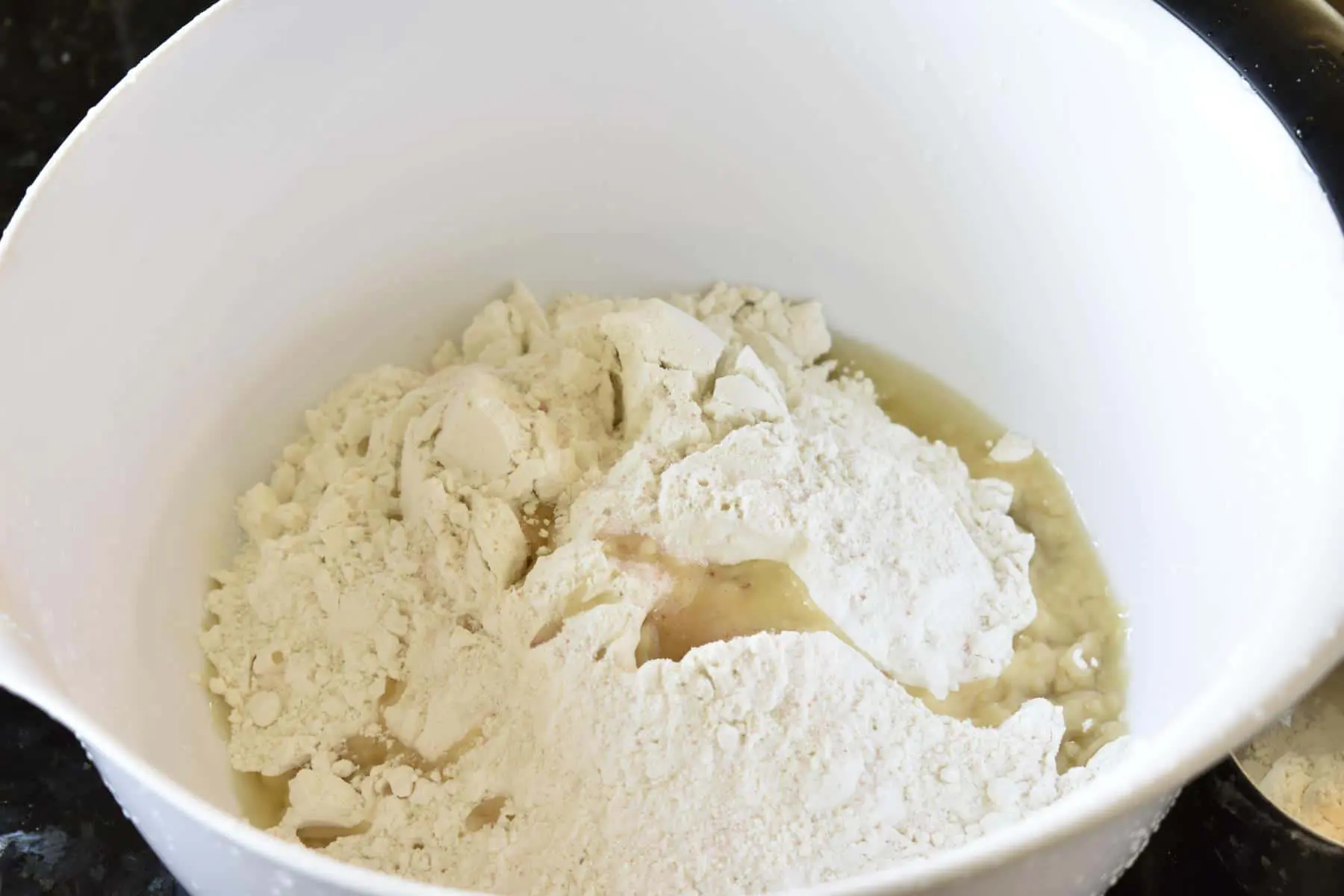
- Add 225 grams of water into a 2-cup glass measuring cup. Gradually add the water into the mixing bowl while mixing and pressing flour together using two hands, until it forms a stiff rough dough
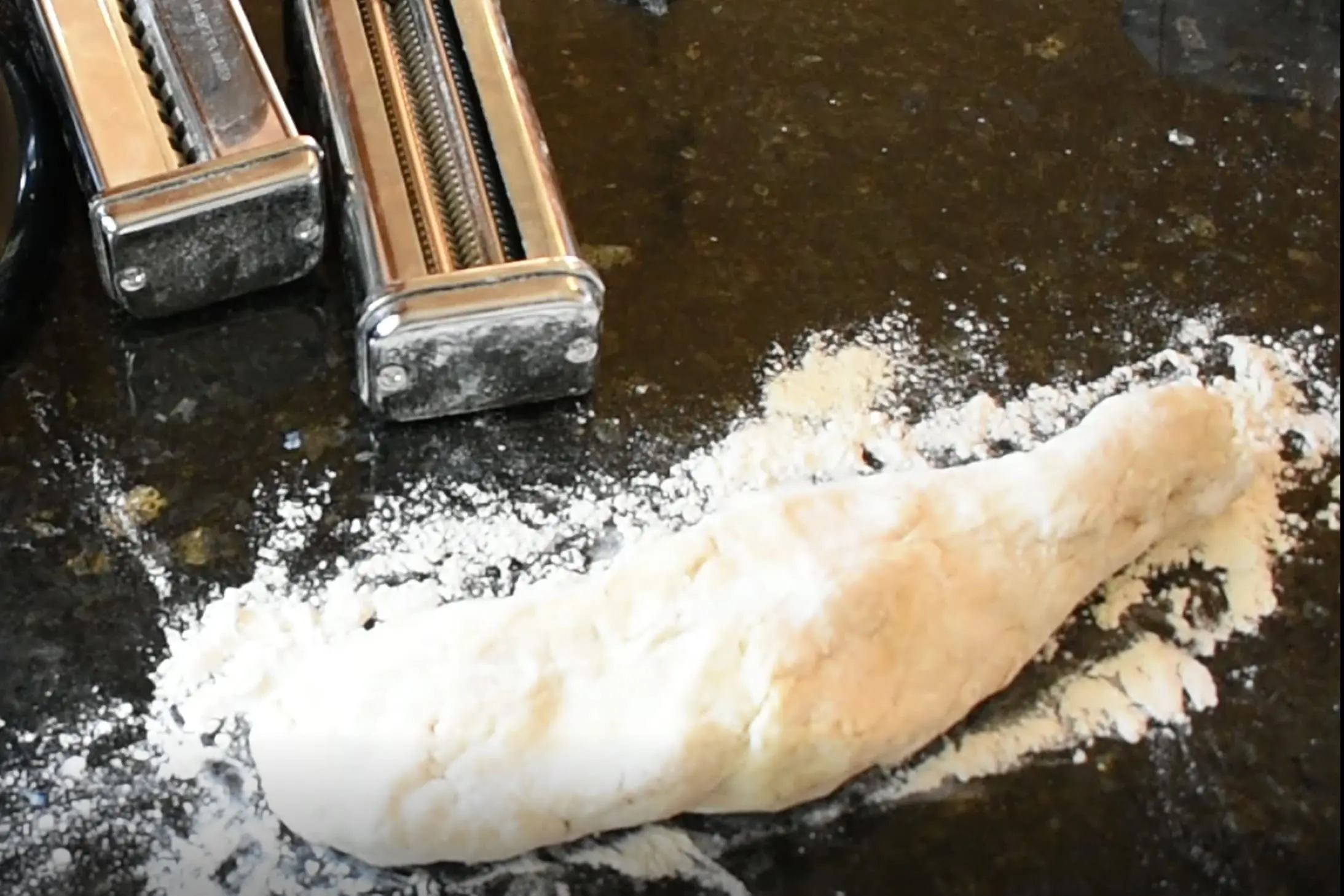
- If the dough is still too dry to form a dough, slowly add drops of the water at a time until you can do so.
- Cover the mixing bowl with a damp kitchen towel, and let it rest at room temperature for about 10 minutes
- While waiting, fill a stockpot with 75% full of water, bring it to a boil, and then turn off the heat.
Step 2: Form Noodle Sheets
- Take the dough out, cut into 7-8 equal portions, sprinkle the countertop with a thin layer of flour
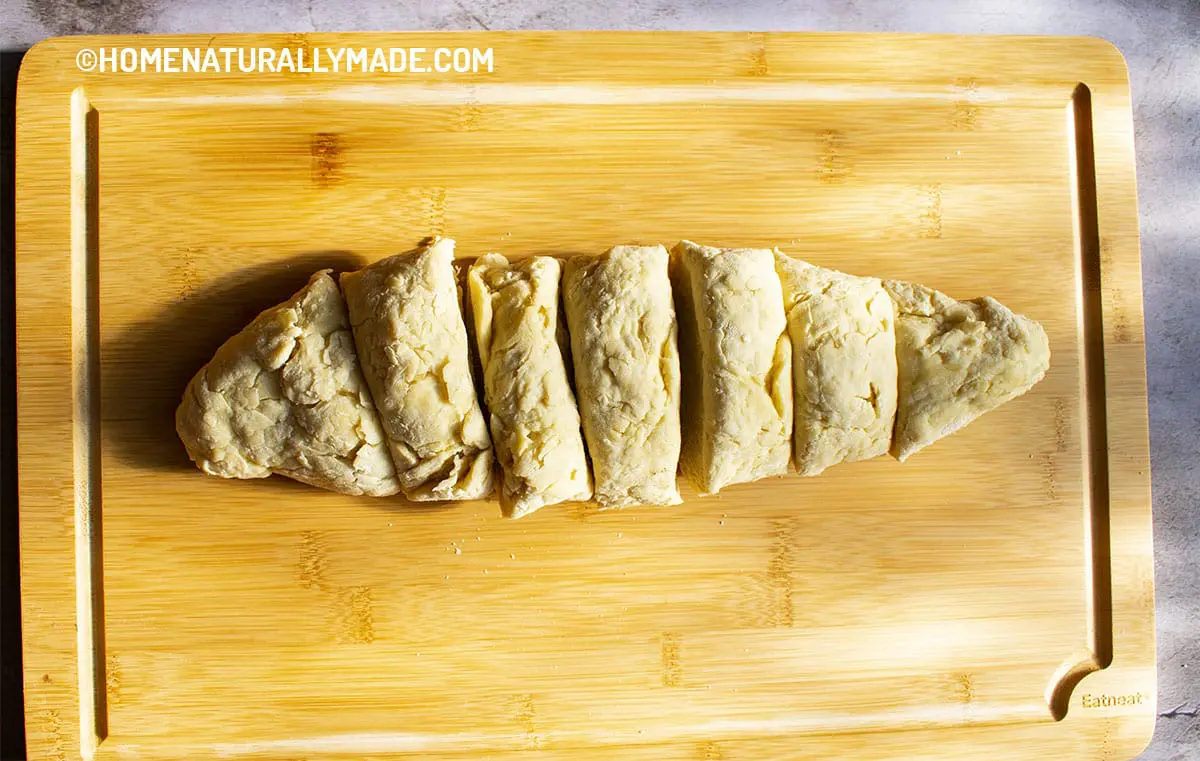
- For each portion, generously coat the dough with flour and knead slightly
- Take one portion out, flatten it out and shape it into a narrow thick dough slab, about 4 inches wide. Repeat this for all remaining portions of dough.
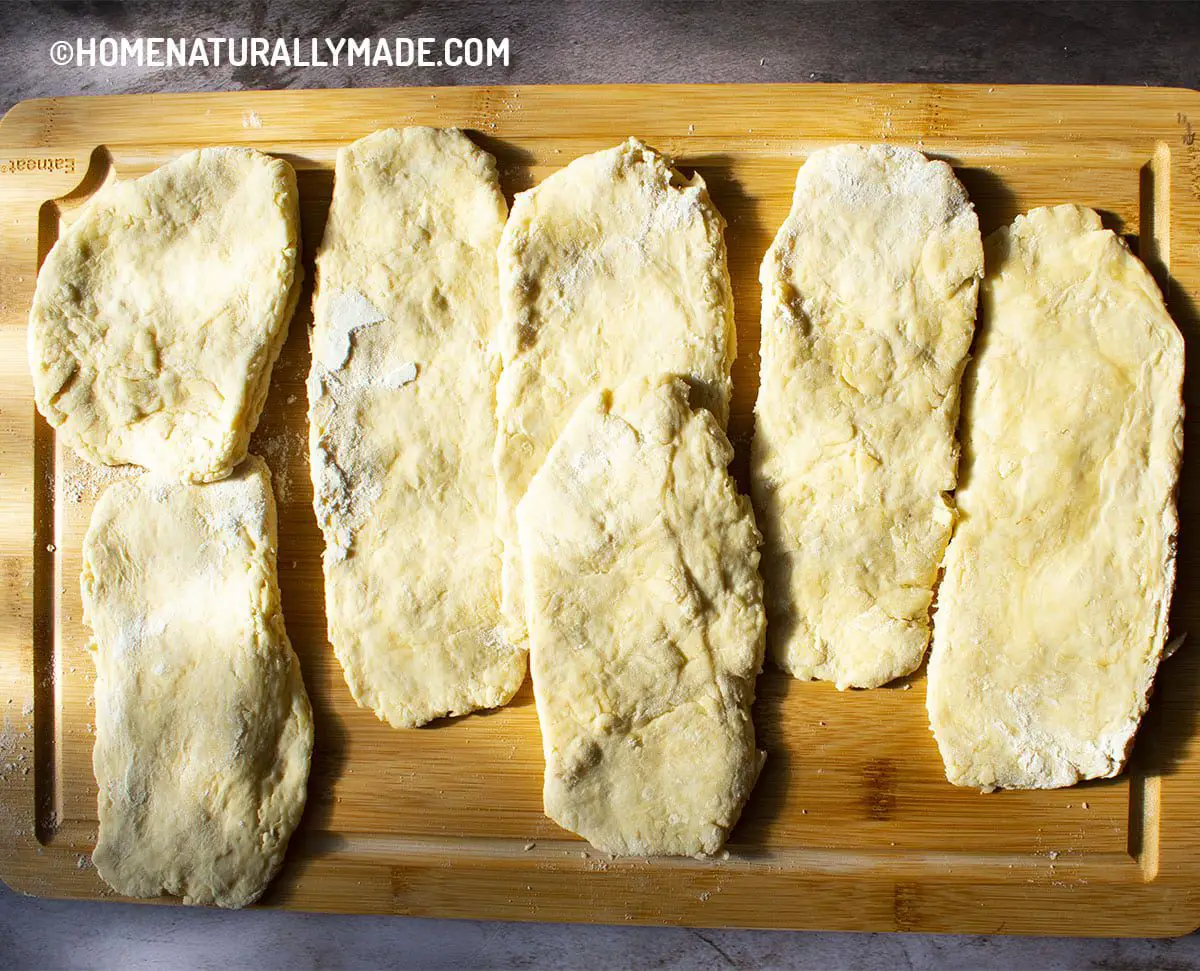
- Attach Kitchen Aid roller, take one piece of the flat dough sheet at a time, roll it through the roller starting from setting 1, and then move on to 2 and 3.
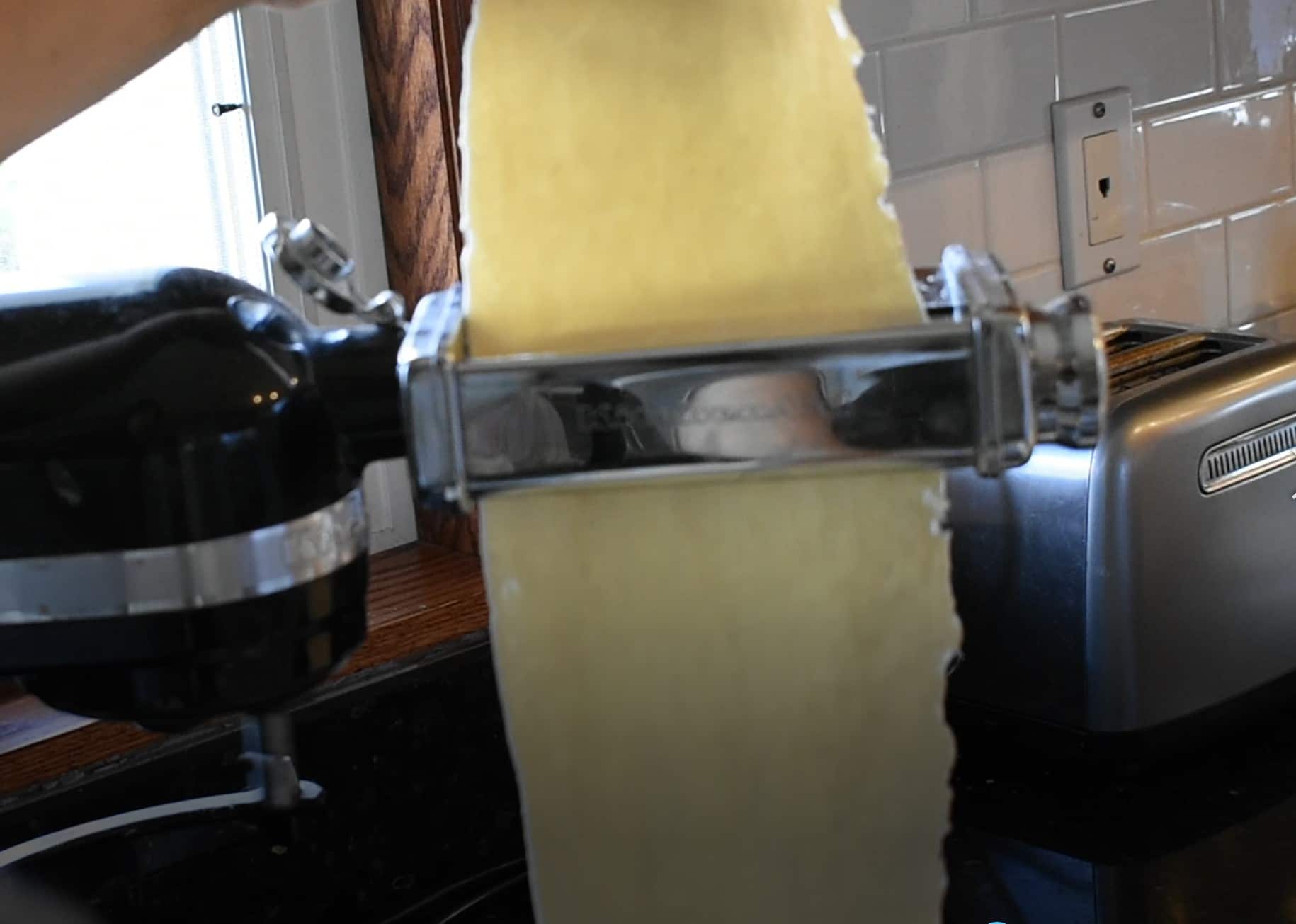
- Dust the dough sheet with flour, and repeat for the remaining 7 pieces.
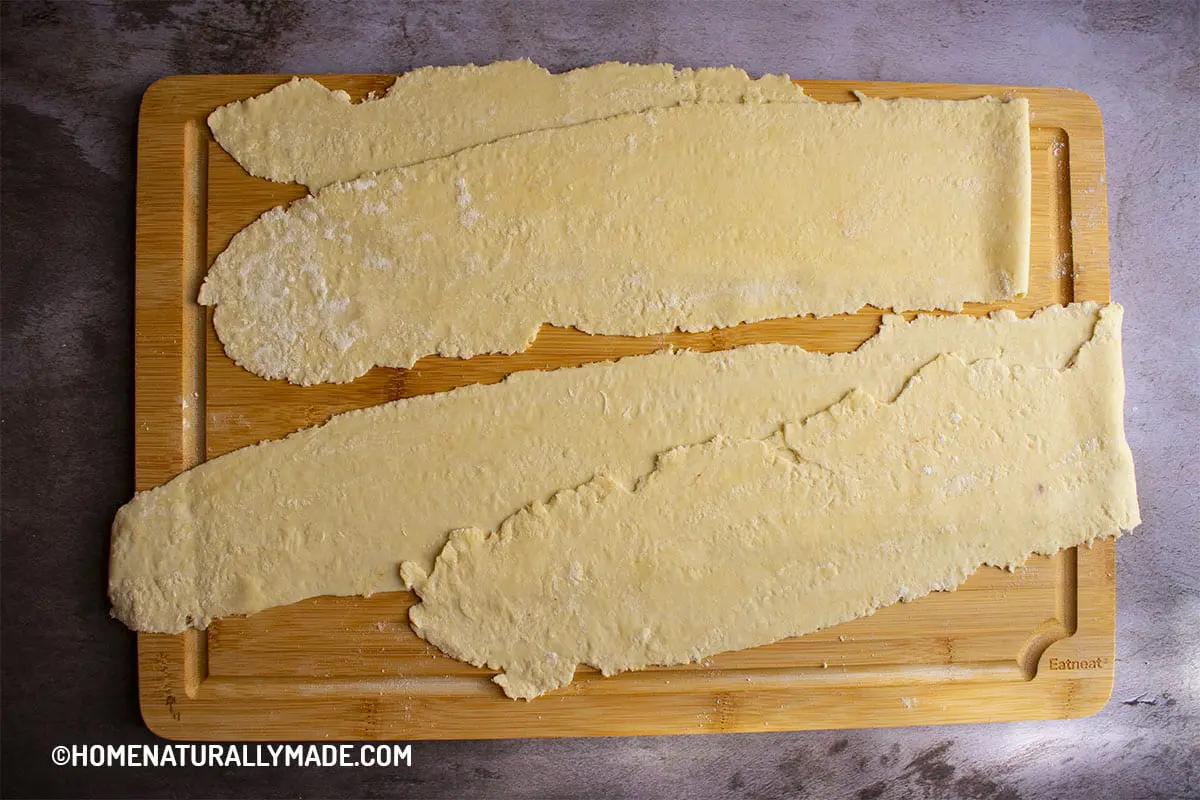
Step 3: Cut Noodle Sheets into Noodles
- Attach Kitchen Aid noodle cutter, pick up 1 noodle sheet at a time, turn the machine to medium-high, cut the noodle to the desired width.
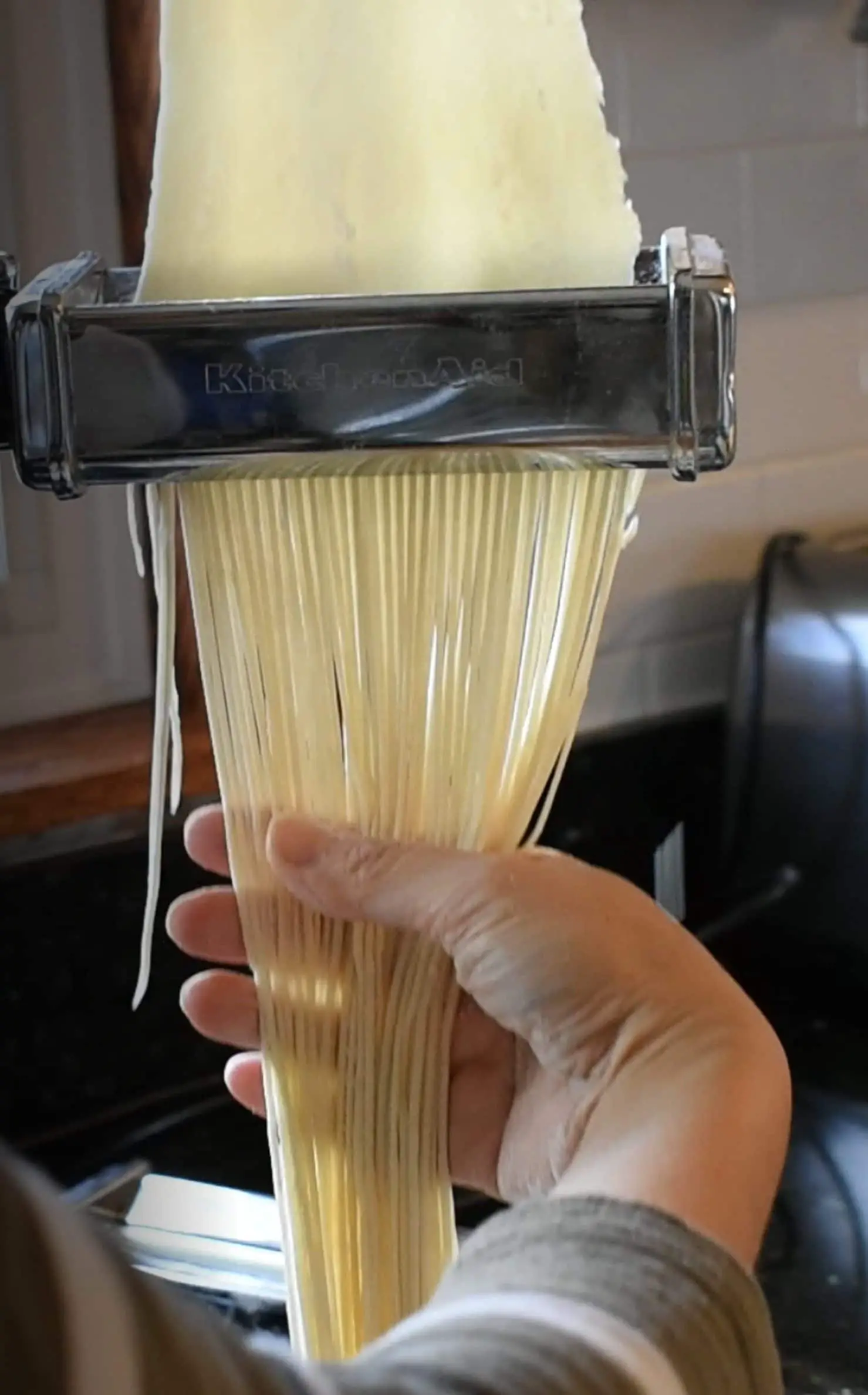
- Swirl the noodles and loosely place them into piles each with a handful of noodles.
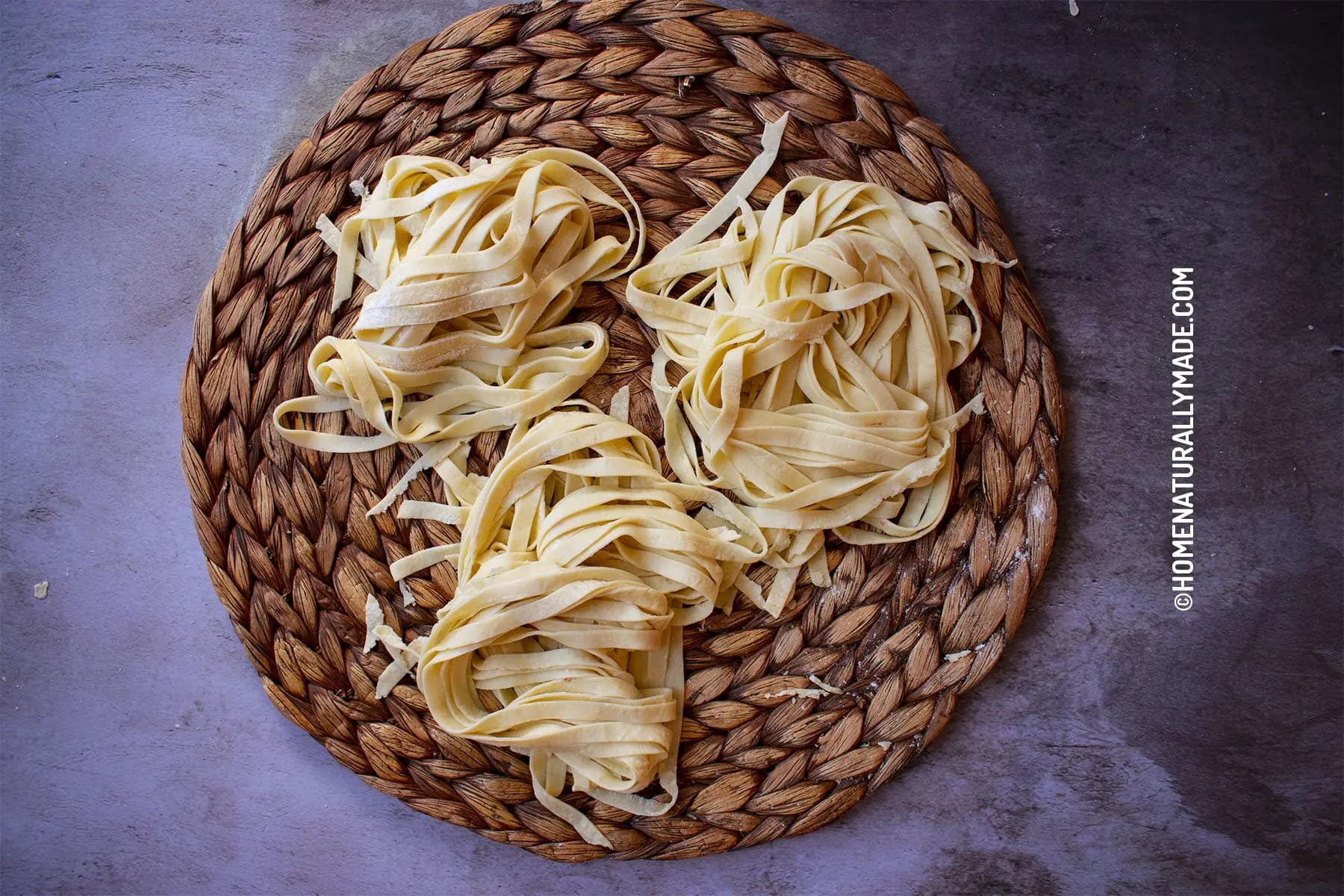
Step 3: Cook the noodles
- Bring the stockpot water back to a boil, add only a handful of noodles at a time, immediately stir gently to separate them using tongs or a pair of long & thick bamboo chopsticks.
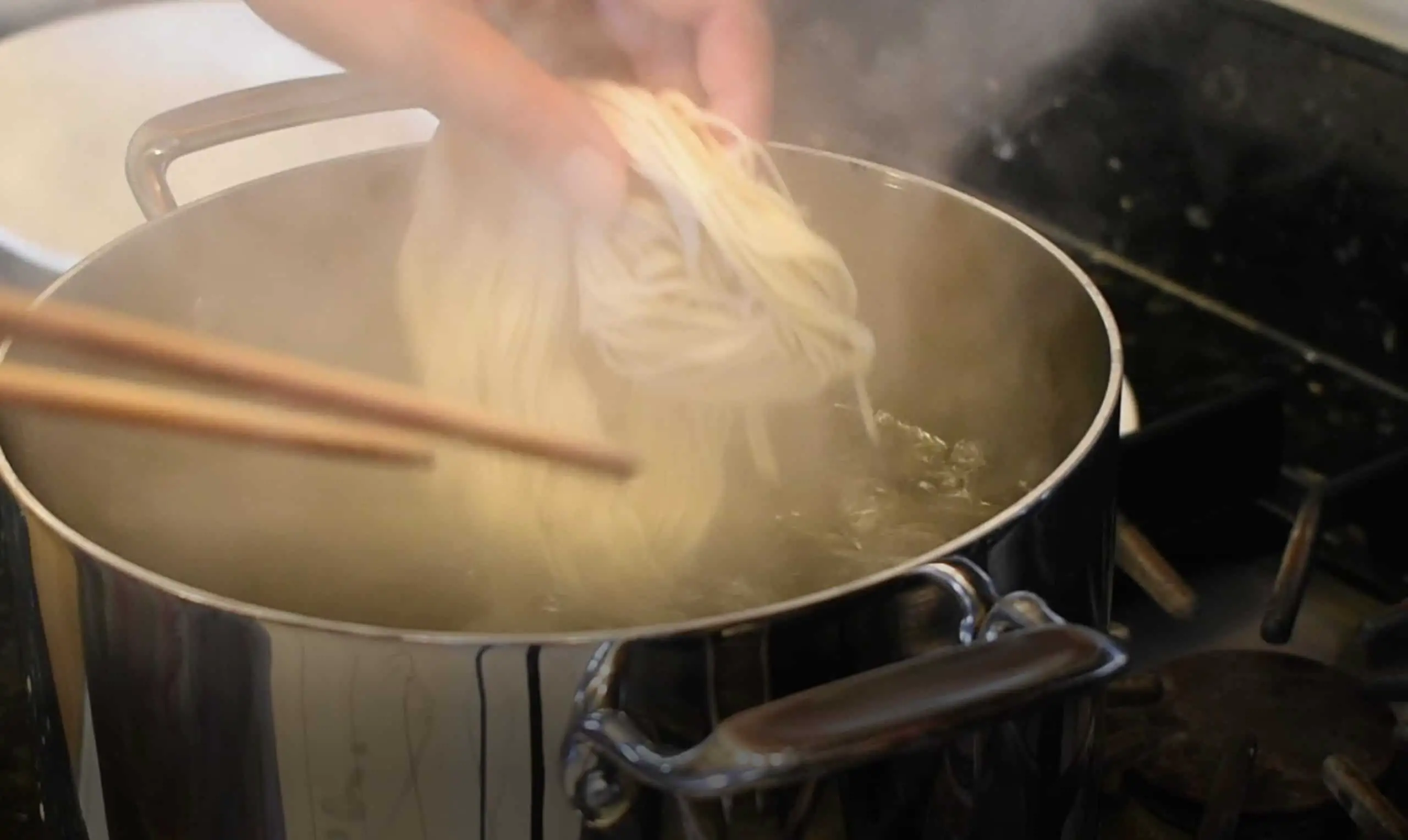
- Cook for about 1 minute till the noodles float at the top of the water, and then take the noodle out using a skimmer and chopsticks, or your favorite utensils, and place onto a big plate.
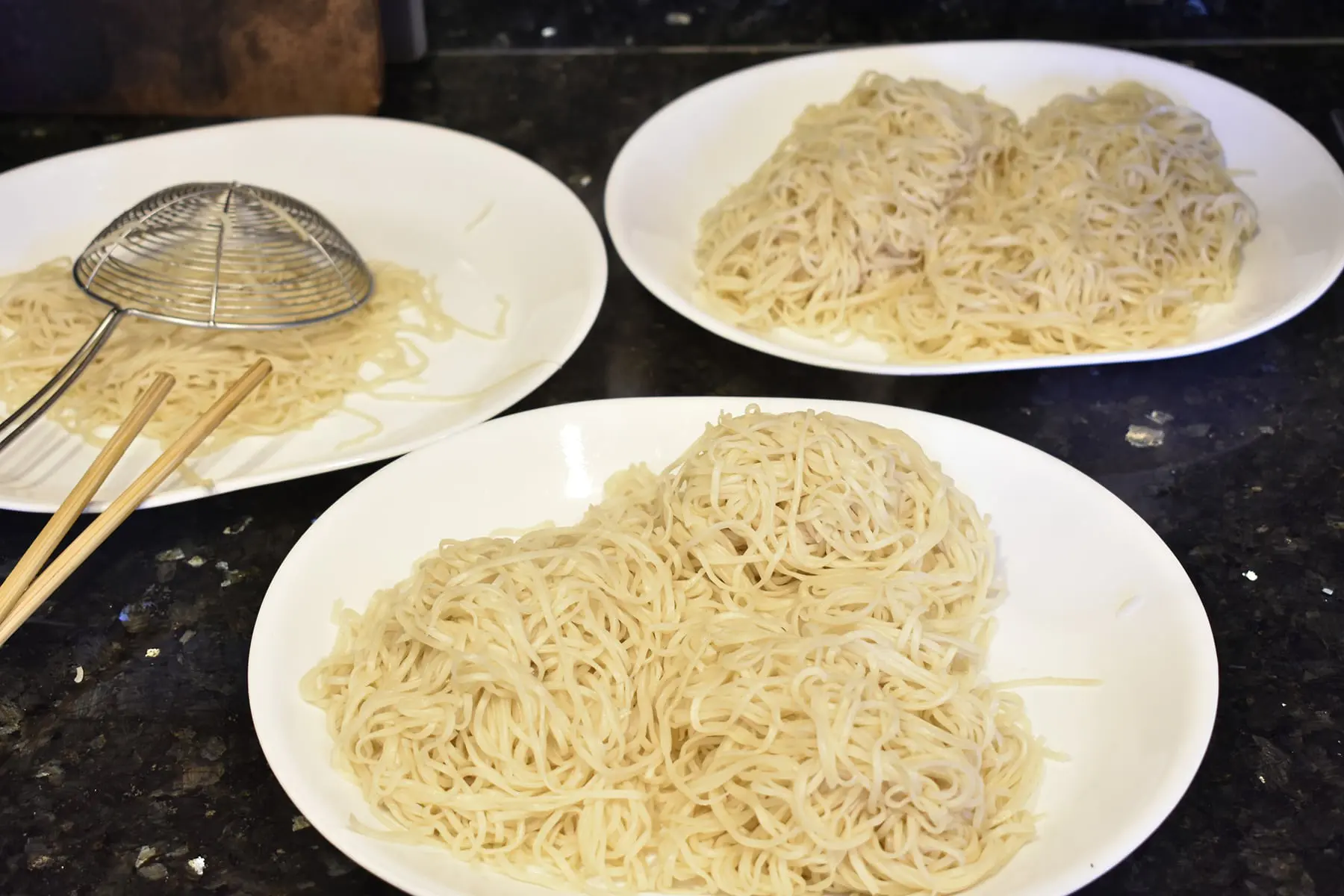
- Repeat for the remaining noodles.
Notes
- To make the measurement easier and accurate, I use gram as the unit, which you can manage with ease using a kitchen scale. The "TARE" function of the kitchen scale is especially helpful to add incremental ingredients into the mixing bowl.
- Don't let the dough rest for more than 10 min.
- It is normal to feel a little resistance when the thick dough sheet going through the roller for the first time.
- Gently stir the noodles on the plate after cooking to let out steam and avoid them stick together.
- These cooked noodles are good for one week in the refrigerator. Extra ones can be stored in the freezer in quarter-size ziplock bags.
- When you are ready to use the frozen noodles, place the frozen noodles in a big pot of boiling water, quickly separate them, and take them out.
Recommended Products
As an Amazon Associate, I earn a small amount of commission from the qualifying purchases.
-
 kitchen towels
kitchen towels -
 Pyrex Prepware 2-Cup Glass Measuring Cup
Pyrex Prepware 2-Cup Glass Measuring Cup -
 Kitchen Scale
Kitchen Scale -
 MARCATO Atlas 150 Pasta Machine, Made in Italy, Includes Cutter, Hand Crank, and Instructions, 150 mm, Stainless Steel
MARCATO Atlas 150 Pasta Machine, Made in Italy, Includes Cutter, Hand Crank, and Instructions, 150 mm, Stainless Steel -
 OXO Good Grips 3- Piece Mixing Bowl Set
OXO Good Grips 3- Piece Mixing Bowl Set -
 Soeos Whole Black Peppercorns 18OZ + Himalayan Salt 38oz + Grinders 2 Packs.
Soeos Whole Black Peppercorns 18OZ + Himalayan Salt 38oz + Grinders 2 Packs. -
 Avocado Oil
Avocado Oil -
 Organic All-Purpose Flour
Organic All-Purpose Flour -
 Viking 3-Ply Stainless Steel Stock Pot, 12 Quart
Viking 3-Ply Stainless Steel Stock Pot, 12 Quart -
 extra long cooking chop sticks
extra long cooking chop sticks -
 Solid Stainless Steel Spider Strainer Skimmer
Solid Stainless Steel Spider Strainer Skimmer -
 KitchenAid Stand Mixer
KitchenAid Stand Mixer -
 Pasta Maker Attachments Set for all KitchenAid Stand Mixer, including Pasta Sheet Roller, Spaghetti Cutter, Fettuccine Cutter by Nevku
Pasta Maker Attachments Set for all KitchenAid Stand Mixer, including Pasta Sheet Roller, Spaghetti Cutter, Fettuccine Cutter by Nevku
Nutrition Information
Yield 8 Serving Size 1Amount Per Serving Calories 397Total Fat 11gSaturated Fat 3gTrans Fat 0gUnsaturated Fat 7gCholesterol 0mgSodium 216mgCarbohydrates 65gFiber 2gSugar 0gProtein 8g
Nutrition calculation is provided by Nutritionix to the best knowledge per ingredients description and isn't always accurate.
